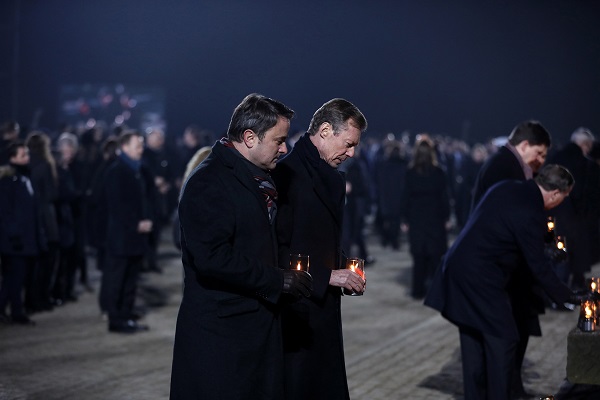 Prime Minister Xavier Bettel and HRH the Grand Duke of Luxembourg;
Credit: Sophie Margue / Cour grand-ducale
Prime Minister Xavier Bettel and HRH the Grand Duke of Luxembourg;
Credit: Sophie Margue / Cour grand-ducale
On Monday 27 January 2020, Luxembourg's Prime Minister Xavier Bettel and His Royal Highness the Grand Duke attended the international commemoration of the 75th anniversary of the liberation of the Auschwitz-Birkenau concentration and extermination camp.
Held on the occasion of International Holocaust Remembrance Day, the ceremony began with a welcoming speech by Poland's President Andrzej Duda, after which survivors of the Auschwitz-Birkenau camp shared their experiences with those present.
Marian Turski, a Polish journalist of Jewish origin and president of the Jewish Historical Institute in Warsaw, highlighted the duty to remember, recalling that the Holocaust can happen anywhere and at any time. Piotr M. A. Cywiński, director of the Auschwitz-Birkenau State Museum, also addressed the heads of delegation thanking them for their presence.
To pay homage to the victims of the concentration and extermination camp, the heads of delegation, accompanied by survivors of the camp, went to the International Monument via the railroad track, where the convoys of deportees had arrived between spring 1942 and May 1944.
The commemorative ceremony came to a close with the heads of delegation and more than 200 survivors placing lit candles on the national memorial plaques.
At the end of the commemoration, Luxembourg's Prime Minister concluded: "The 75th anniversary of the liberation of Auschwitz-Birkenau must serve as an occasion for us to remember and pay tribute to the men, women and children who were murdered, tortured and dehumanised here during the Nazi regime and to remember all the atrocities that occurred here and across Europe. We must remember the Holocaust so that no one will ever forget what happens when we let hate spread. I hope that the commemoration of the 75th anniversary of the liberation of the Auschwitz-Birkenau camp reminds people to stand up fervently against all forms of intolerance, exclusion and discrimination against others. It is an honour to be in the presence of the survivors of this horrible place. They are the direct link to the past, the witnesses to this atrocious crime".








